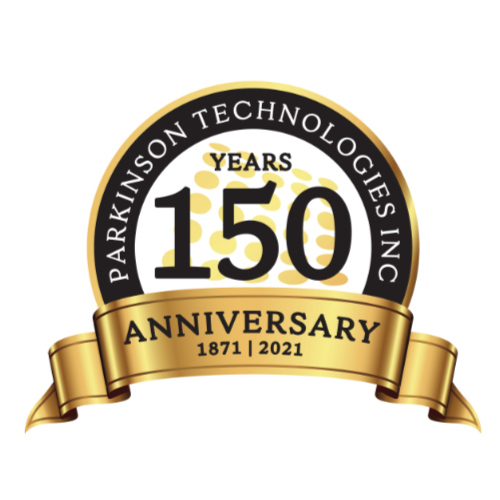
May 21 2021
Parkinson Technologies is pleased to announce its 150th anniversary. It is not often a company can trace its lineage back 150-years. However, this year Parkinson achieved this incredible milestone. Each of the four brands started from humble beginnings. Yet today, the company has evolved into a global technology leader in high-performance web processing systems for the plastics, nonwovens, paper, and specialty materials industries.
Parkinson Winders
The company started in 1871, when Edward Parkinson, a young machinist from England, established the Edward Parkinson Mfg. Co. making and repairing loom forks and sewing machines. Mr. Parkinson moved his wife and daughter from Lancaster, Lancashire, England, to Providence, RI, around 1869, during a time of rebuilding and healing after a difficult four-year civil war.
During Mr. Parkinson's time growing the small machine shop, his company evolved to include many types of machinery. From 1884-1906, the company was awarded patents that included a knitting machine, a weft fork for looms, and a bobbin winder. Though relatively small, these machines and components echoed what the company's future would eventually become. Edward Parkinson passed away in 1907, leaving the company to his daughter and son-in-law, George Clarence Clark, who ran the company until passing it along to their son Edward Parkinson.
In 1941, Alan Metzger purchased the Edward Parkinson Company. Mr. Metzger, a talented engineer, relocated the company to Oak Street in Esmond, Rhode Island. The company developed a new product line, including surface winders for textiles, which were first manufactured in 1943. Under Mr. Metzger, the company expanded and grew for the next 25 years.
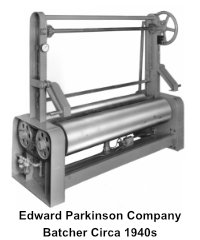 Alan Metzger died in 1983, and the ownership passed to his children, including Alan Metzger, Jr. Harry Prince was the new president from 1983 to his retirement. During Mr. Prince’s presidency, the company continued to expand its business supplying its automatic and manual surface winders for the textile industry and turret winders for the rapidly growing plastics industry. Upon the retirement of Harry Prince in 1991, Alan Metzger, Jr. assumed the presidency. Although the company expanded during its management, in 1993 the company was acquired by the current owner.
Alan Metzger died in 1983, and the ownership passed to his children, including Alan Metzger, Jr. Harry Prince was the new president from 1983 to his retirement. During Mr. Prince’s presidency, the company continued to expand its business supplying its automatic and manual surface winders for the textile industry and turret winders for the rapidly growing plastics industry. Upon the retirement of Harry Prince in 1991, Alan Metzger, Jr. assumed the presidency. Although the company expanded during its management, in 1993 the company was acquired by the current owner.
The company was renamed Parkinson Machinery and Manufacturing, Inc. and embarked on a new chapter in its long history. The company has been completely reorganized and its technology redefined to meet the requirements of the nonwovens, paper, and plastics industries. In 1995, the company moved its operations to the current Woonsocket, RI location.
Marshall and Williams Plastics
In the spring of 2000, Parkinson acquired the plastics division of Marshall and Williams Plastics and combined operations with its facility in Woonsocket. In 1920, Robert Marshall and John H. Williams founded Marshall and Williams Manufacturing Company, Inc. and opened their business on Calendar Street in Providence, Rhode Island in August 1921 for the sole purpose of repairing and servicing tenter clips used by the New England textile finishing industry. Robert Marshall served as the company’s first president. By 1925, business growth substantiated the manufacture of new tenter clip systems, prompting a move to a building on Westfield Street, doubling its space. In the summer of 1937, the company expanded the business to include the manufacture of tenter frames and relocated to Baker Street.
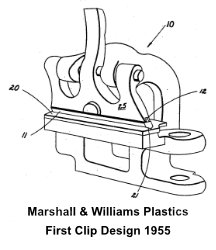 Early in 1946, new owners purchased the company and Richmond Viall was elected president and John Nash vice president. Later that year, the company established a sales and service operation in Greenville, SC. Around 1950, DuPont de Nemours, Inc., unmistakingly known today as simply DuPont, asked M&W about the possibility of modifying a textile tenter frame to stretch a thermoplastic material being developed by DuPont. As a result, during the following year the company completed the world’s first transverse stretching machine (now referred to as a TDO) and film tenter clip.
Early in 1946, new owners purchased the company and Richmond Viall was elected president and John Nash vice president. Later that year, the company established a sales and service operation in Greenville, SC. Around 1950, DuPont de Nemours, Inc., unmistakingly known today as simply DuPont, asked M&W about the possibility of modifying a textile tenter frame to stretch a thermoplastic material being developed by DuPont. As a result, during the following year the company completed the world’s first transverse stretching machine (now referred to as a TDO) and film tenter clip.
Upon Richmond Viall’s retirement in 1959, John Nash became president. In 1960, development of the company’s first machine direction film stretcher (MDO) began. The next year, Frederick Hyatt, an engineer from Greenville, SC (and son-in-law of John Nash) was transferred to Providence specifically to further the development of machinery to produce biaxially oriented thermoplastic film. Those efforts resulted in the issuance of many patents, pioneering the machinery used for orientation of plastic film. From this, M&W became recognized as the world’s leader in this type of machinery. It soon became apparent that a small line of on-site equipment would be necessary to validate M&W’s technical claims and to assist in resin and film development by M&W customers. In June 1962, the world’s first non-captive biaxial orientation film laboratory became operational.
In 1964, Bevis Industries, Inc. purchased M&W. John Nash continued as president. Over the next few years, export sales became more significant, primarily with plastic film machinery sales, and in 1968, the company formally established the Plastics Division. The following year, John Nash retired, and Frederick Hyatt became president. By then, the Plastics Division of M&W was deeply entrenched in the film industry. A management buyout took place in July 1971. The group consisted of six M&W managers (four in RI and two in SC).
In 1980, Frederick Hyatt stepped down and Stuart MacDonald became president. That same year, all textile machinery manufacturing was transferred to SC, and machinery manufacturing in RI was dedicated exclusively to film machinery. By 1990 the Plastics Division had gained a prominent position in the plastics industry, particularly in the BOPS (biaxially oriented polystyrene) marketplace, capturing 75% of the global BOPS market. Throughout the 1990s, the Plastics Division expanded its product line and provided complete turnkey process systems.
The company now operates as a brand of Parkinson Technologies Inc. and is the only large-scale manufacturer of equipment for biaxially oriented equipment in the United States. It has installed biax lines throughout the world, and it supports its customer base with a pilot/laboratory facility.
Key Filters
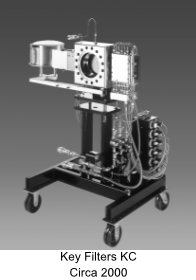 In 2001, Parkinson Machinery and Manufacturing, Inc. changed its name to Parkinson Technologies Inc. During this time, the company brought Key Filters, which was acquired in 1989, under the Parkinson Technologies, Inc. umbrella to establish a concise family of machinery brands. Key Filters started in 1983 by John Fogarty, who developed a continuous filtration system whereby seal bars were attached to a wire mesh belt. As the contaminates collected on the screen and the pressure increased, he developed a system using heating and cooling of the polymer to seal the material inside the screen changer that allowed the screen belt to advance, based on a pressure build-up, without interruption of the flow to the die. This system allowed the screen belt to discharge the contaminates continuously without interruption and is the basis of the Key Filters KC, KCN, and the most recent KCH Continuous Belt Screen Changer.
In 2001, Parkinson Machinery and Manufacturing, Inc. changed its name to Parkinson Technologies Inc. During this time, the company brought Key Filters, which was acquired in 1989, under the Parkinson Technologies, Inc. umbrella to establish a concise family of machinery brands. Key Filters started in 1983 by John Fogarty, who developed a continuous filtration system whereby seal bars were attached to a wire mesh belt. As the contaminates collected on the screen and the pressure increased, he developed a system using heating and cooling of the polymer to seal the material inside the screen changer that allowed the screen belt to advance, based on a pressure build-up, without interruption of the flow to the die. This system allowed the screen belt to discharge the contaminates continuously without interruption and is the basis of the Key Filters KC, KCN, and the most recent KCH Continuous Belt Screen Changer.
Dusenbery Converting Systems
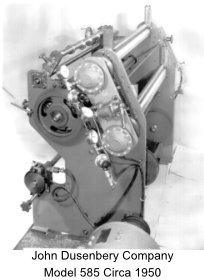 In 2008, Parkinson Technologies Inc. acquired the assets of the John Dusenbery Company, a well-known manufacturer of slitter rewinders and other converting equipment. John Dusenbery started his company in 1947, adjusting magnetic compasses and manufacturing sextants for the U.S. Navy but turned to peacetime manufacturing of wire drawing machines. In the late 1940s, the first slitter rewinder, known as the Model 585, was engineered for pressure-sensitive acetate tape. Now under Parkinson Technologies, the brand was renamed to Dusenbery Converting Systems.
In 2008, Parkinson Technologies Inc. acquired the assets of the John Dusenbery Company, a well-known manufacturer of slitter rewinders and other converting equipment. John Dusenbery started his company in 1947, adjusting magnetic compasses and manufacturing sextants for the U.S. Navy but turned to peacetime manufacturing of wire drawing machines. In the late 1940s, the first slitter rewinder, known as the Model 585, was engineered for pressure-sensitive acetate tape. Now under Parkinson Technologies, the brand was renamed to Dusenbery Converting Systems.
Parkinson Technologies Today
Today Parkinson Technologies, Inc. continues to thrive and evolve. The Parkinson Winders brand remains one of the premier sources of web winding technology. Marshall and Williams Plastics continue to innovate and adapt to the changing plastics market, offering orientation systems installed worldwide. Key Filters offers the innovative KCH continuous belt screen changer. Dusenbery Converting Systems recently reorganized its offerings into the new MasterSlit™ lineup that includes the newly engineered DC2 and DC4 duplex slitter rewinders.
“It is truly fascinating to think about the lineage of our company and the historical eras it has witnessed. There are very few businesses that can say they’re celebrating 150 years of continuous operation. It’s a testament to all those who supported Parkinson and its brands over the years,” says Peter Termyn, President and CEO of Parkinson Technologies. “Here is to another 150-years.”